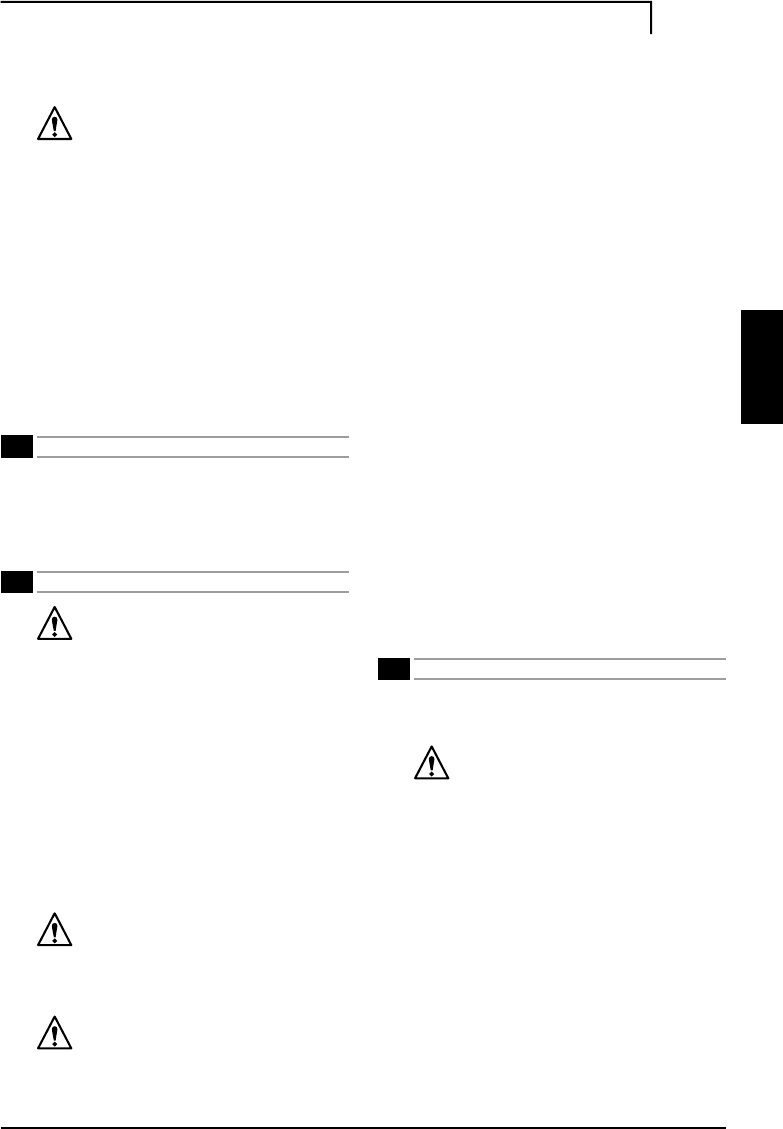
3.3 Assembling the rotating nozzle (where fitted)
The rotating nozzle kit delivers greater washing power.
3.4 Water supply connection
Caution - Danger!
Only clean or filtered water should be used for
intake. The delivery of the water intake tap should
be equal to that of pump capacity.
Do not use container and tanks to supply the appli-
ance.
Place the cleaner as close to the water supply system
as possible.
3.4.1 Connection points
l Water outlet (OUTLET)
n Water inlet with filter (INLET)
3.4.2 Connection to the mains water supply
The cleaner can be connected directly to the
mains drinking water supply only if the supply
hose is fitted with a backflow preventer valve
as per current regulations in force. Make sure
that the hose is at least Ø 13 mm and that it is
reinforced.
4
ADJUSTMENTS FIG. 3
4.1 Adjusting the pressure
The regulator (G) is used to adjust the working pressure.
The pressure is shown on the pressure gauge.
4.2 Adjusting the nozzle
Water flow is adjusted by regulating the nozzle (E).
5
INFORMATION FOR USE FIG. 4
Caution - Danger!
Never use the cleaner when malfunctioning.
In the event of damage, the high pressure hose must
be replaced immediately to prevent bursts.
5.1 Preliminary checks
Before using the cleaner, check the oil level:
- in the engine (see engine constructor’s manual);
- in the reduction gearbox (where fitted);
- in the pump.
Check the reduction gearbox and pump oil gauges to
check the oil level. It should be halfway up the gauge. If
necessary, top up with oil having the same characteris-
tics (see the “Oil characteristics” table).
5.2 Controls
For information about the engine controls, refer to the
engine constructor’s manual.
- Water jet control lever (I).
Caution - Danger!
During operation the cleaner must be posi-
tioned on a flat surface firm enough to support it
securely.
5.3 Starting the appliance
Caution - Danger!
Before starting up the cleaner check that the
water supply hose is connected properly; use of the
cleaner without water will damage the appliance.
1) Turn the water supply tap fully on.
2) Release the safety catch (
D).
3) Keep the gun trigger depressed and start the
engine.
4) Keep the gun trigger depressed for a few seconds to
vent the air from the pump.
To prevent damage to the appliance, when running
do not stop the water jet for more than 5 minutes
at a time.
5.4 Stopping
1) Stop the engine.
2) Depress the gun trigger and discharge the residual
pressure inside the hoses.
3) Engage the gun safety catch (
D).
5.5 Refilling and using detergent
IPlace the hose straight in the detergent container.
5.6 Recommended cleaning procedure
Dissolve dirt by applying the detergent mixed with
water to the surface while still dry.
When dealing with vertical surfaces work from the bot-
tom upwards.
Leave the detergent to act for 1-2 minutes but do not
allow the surface to dry. Starting from the bottom, use
the high pressure jet at a minimum distance of 30 cm.
Do not allow the rinse water to run onto unwashed
surfaces.
5.7 Ending the working session
1) Stop the engine.
2) Turn off the water supply tap.
3) Discharge the residual pressure from the gun until all
the water has come out of the nozzle.
4) Engage the gun safety catch
(D).
5) Remove the water intake hose.
6) Remove the detergent hose from the container.
6
MAINTENANCE FIG. 5
Any maintenance operations not covered by this chap-
ter should be carried out by an Authorised Sales and
Service Centre.
Caution - Danger!
Stop the engine before doing any work on
the cleaner.
6.1 Cleaning the filter
Clean the suction filter (L) after every 50 hours of operation.
6.2 Topping up the oil level
The oil level must be topped up with the cleaner on a
flat surface.
Remove the casing (where fitted) to top up the oil level.
Replace the casing (where fitted) when done.
6.2.1 Topping up the pump oil
Add oil through the intake hole to restore the
correct level.
For oil characteristics, refer to the “Oil characteris
-
tics” table.
6.2.2 Topping up the reduction gearbox oil (where fitted)
Add oil through the intake hole to restore the
correct level.
For oil characteristics, refer to the “Oil characteris
-
tics” table.
English 11
ENGLISH











